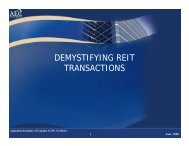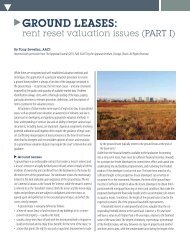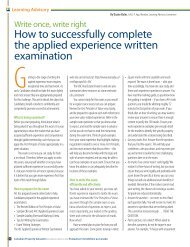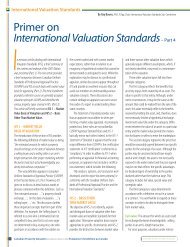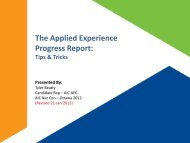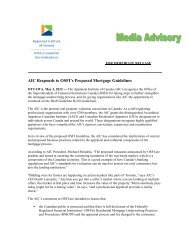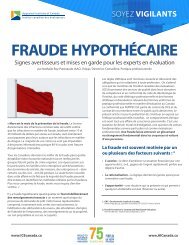From the Counsellor’s DeskConfidential dataRobert Patchett, LL.B.Counsellor, Pr<strong>of</strong>essional PracticeAs an appraiser, you are <strong>of</strong>ten facedwith multiple requests concerninga specific property. You havecompleted an appraisal for one clientand you are asked to appraise for a new client.You may even be asked to simply ‘readdress’the report, ‘recertify’ or ‘reassign’ it. Sometimes,the same client may even ask for an ‘update.’In responding to these types <strong>of</strong> requests, it isimportant to consider the confidentiality andconflict <strong>of</strong> interest sections in the Standards.It is important to clarify your instructions, asthe requesting party may not understand whatthey are asking you to do or may not understandwhat they need, and, more importantly,may not understand what your pr<strong>of</strong>essionalstandards permit.Assignment results are your opinion, conclusionsand factual data collected and renderedspecific to an assignment. The Standards providethat an appraiser cannot disclose confidentialinformation or assignment results to anyoneother than the client and persons authorized,intended users 1 , or as required by law or byvirtue <strong>of</strong> your membership in AIC. The act <strong>of</strong> discussingyour conclusions, even with a peer, couldbe viewed as divulging assignment results.You can accept a new assignment 2 relativeto a previously appraised property, recognizingthat you cannot disclose confidential informationduring this subsequent assignment. In someinstances, however, you may have to disclosein advance if you have previously provided anypr<strong>of</strong>essional services in relation to a property (notyour opinion and conclusions) before acceptingan assignment. 3 By virtue <strong>of</strong> this being a newassignment, the results are confidential, even ifthe conclusions are the same.Confidential information is information that isidentified by the client as confidential when providingit to an appraiser and that is not otherwisepublicly available 4 . It can also be informationthat, by legislation or regulation, is personalinformation as defined in PIPEDA, privacy orbanking legislation, or by regulation published bya regulator such as OSFI or RECA.The <strong>Appraisal</strong> <strong>Institute</strong> <strong>of</strong> <strong>Canada</strong> (AIC) hasconsistently recommended that, in providingassignment results in writing, appraisers includespecific limiting conditions relative to the use <strong>of</strong>data in a report and who may rely on that report.Further, it is recommended that you label eachreport as being Copyright, All Rights Reserved. 5The factual data that you include in your report,along with your opinions, recommendationsand conclusions, should be protected as yourintellectual property. Your data is your ownthat you use in the provision <strong>of</strong> pr<strong>of</strong>essionalservices, and you, in fact, re-use that factualdata and opinions in other assignments,subject to guarding confidential and personalinformation. That data is your knowledge baseand expertise that you rely on in providingpr<strong>of</strong>essional services.It will remain a business decision as towhether or not to accept an assignment, toprovide your opinions, data and conclusions,in whole or in part, or to permit a client to relyon them, in whole or in part, subject to yourpr<strong>of</strong>essional obligation to comply with theStandards, which includes compliance withapplicable legislation and regulations. Thefinal remaining caveat should be to alwaysconsider if there will be coverage under yourpr<strong>of</strong>essional errors and omission insurancepolicy, should you choose to accept a particularassignment.End notes1See CUSPAP 2010 Section 6.2.1. For examplein a litigious matter, the lawyers, courts andparties to the litigation would normally allreceive copies.2It is recommended that, before taking onan assignment for a consumer or mortgagebroker, you explain that a lender may decidethemselves if they need an appraisal andwho may perform that appraisal. In practice,to avoid fraud, lenders would not normallyaccept such a report that they had not orderedthemselves.3See CUSPAP 2010 Section 12.8.144See CUSPAP 2010 Section 2.175See Handbook on Disclosure Guidelines Section 2.742Canadian Property Valuation Volume 54 | book 4 | 2010 Évaluation Immobilière au <strong>Canada</strong>click here to return to table 0f contents
Learning AdvisoryBy Larry Dybvig, AACIIntroducing The <strong>Appraisal</strong> <strong>of</strong>Real Estate, Third Canadian EditionThe US <strong>Appraisal</strong> <strong>Institute</strong> recently updatedits <strong>Appraisal</strong> <strong>of</strong> Real Estate text to the 13 thedition. Over an 18-month period, I servedas part <strong>of</strong> the updating team, one <strong>of</strong> the 44 contributors,reviewers and consultants now listed in thebook’s acknowledgements. Today, I am pleased tohave the opportunity to bring these improvementsinto <strong>Canada</strong>, with the publication <strong>of</strong> the <strong>Appraisal</strong> <strong>of</strong>Real Estate, Third Canadian Edition.The <strong>Appraisal</strong> <strong>of</strong> Real Estate is considered bymany to be ‘the bible <strong>of</strong> the valuation pr<strong>of</strong>ession’ in<strong>Canada</strong>, as well as in the US, Australia and abroad,with translations in 12 languages. The SecondCanadian Edition sold nearly 7,000 copies over itseight-year life, making it a Canadian best-seller. Thisbook has served well as the <strong>Appraisal</strong> <strong>Institute</strong> <strong>of</strong><strong>Canada</strong>’s (AIC’s) key publication and the repository<strong>of</strong> the <strong>Institute</strong>’s ‘body <strong>of</strong> knowledge.’ The <strong>Appraisal</strong><strong>of</strong> Real Estate is the central reference text for allvaluation practitioners in <strong>Canada</strong> – a ‘must have’ foranyone with a pr<strong>of</strong>essional interest in appraisal or aninterest in real estate value in general.The Third Canadian Edition reflects the evolvinglanguage in pr<strong>of</strong>essional standards, changingmarkets (for better or worse), ongoing issues in theregulatory environment, and changes in the appraisalbody <strong>of</strong> knowledge, as recognized in peer-reviewedpr<strong>of</strong>essional texts and journals and in the educationalmaterials <strong>of</strong> AIC and other appraisal organizations.Michael McKinley, editor <strong>of</strong> the US edition, says, “Thenew edition is not a radical departure from what isfamiliar to long-time readers and users, nor is it asimple repackaging <strong>of</strong> old information.” He explainsthe updating was more “a process <strong>of</strong> refinementrather than revolution,” reflecting the changingappraisal pr<strong>of</strong>ession in recent years.The Third Canadian Edition addresses changes tothe Canadian Uniform Standards <strong>of</strong> <strong>Appraisal</strong> Practice(CUSPAP), reflecting the Standards evolution sincetheir 2001 introduction. One example is the changingnature <strong>of</strong> valuation practice and the increasingneed to understand and clearly define the ‘scope <strong>of</strong>work’ in all pr<strong>of</strong>essional assignments.Globalization is another issue that is emphasizedmore strongly in the Third Canadian Edition. Whilereal estate is traditionally dominated by local issues(the age-old maxim ‘location, location, location’),the global movement <strong>of</strong> capital and the pervasiveimpact <strong>of</strong> international financial trends has hadincreasing prominence in real property markets. Withglobalization comes the need for International ValuationStandards (IVS) to account for situations whereCUSPAP is not the applicable standard.Along the same lines, the accounting pr<strong>of</strong>ession’smove from GAAP to International FinancialReporting Standards (IFRS) is causing changes inthe Canadian valuation landscape and to CUSPAP.The Third Canadian Edition addresses the growingcollaboration between valuation pr<strong>of</strong>essionalsand accountants, with these changing accountingstandards potentially opening the door for morework in valuation for financial reporting, but alsoimposing new pr<strong>of</strong>essional obligations for appraisersin providing compliant valuation adviceThe Third Canadian Edition also reflects society’sconcerns regarding environmental issues surroundingreal estate, with the addition <strong>of</strong> materials ongreen building and sustainability, as well as valuingproperties with impairments.Overall, the Third Canadian Edition has increasedfrom 27 chapters to 30, and from 681 pages to 768.New chapters have been added on appraisal reviewand consulting, the use <strong>of</strong> statistics in valuation, andvaluation for financial reporting. The expanded focuson all three <strong>of</strong> these topics, moving from appendices orshort sections into freestanding chapters, reflects theirincreasing importance in Canadian valuation work.In closing, I am proud once again to have hadthe privilege to document the work <strong>of</strong> Canadianvaluation pr<strong>of</strong>essionals, and to be a part <strong>of</strong> the teampublishing the preeminent publication <strong>of</strong> its kind inour country. I anticipate the <strong>Appraisal</strong> <strong>of</strong> Real Estate,Third Canadian Edition, will become an indispensiblebook in the library <strong>of</strong> all valuation pr<strong>of</strong>essionals andfor anyone else who wants to know more about thebasis <strong>of</strong> real property value in <strong>Canada</strong>.Learning Advisory CommitteeCharles Abromaitis, AACI – ChairClifford Smirl, AACIPeter MacLellan, AACIErica Giesbrecht, CandidateJohn Bridal, UBCAndre Gravelle, UBCSigne Holstein, ED, AIC – ONDavid Shum, AACI – Board LiaisonTo contact this committee, email:lac@aicanada.caclick here to return to table 0f contentsCanadian Property Valuation Volume 54 | book 4 | 2010 Évaluation Immobilière au <strong>Canada</strong> 43



